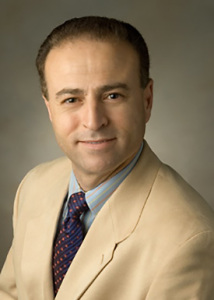May 15, 2017:

Jatin Rana, MD
Investigator Spotlight
Jatin Rana, MD
Educational Background: BS from University of Michigan, MS from Wayne State University, and MD from Wayne State University
Research Interests: My primary interests both clinically and investigational is in gastrointestinal and breast malignancies. As a young investigator I’m excited to offer treatment opportunities through clinical trials for my patients. I am also involved in developing quality improvement projects to provide the best oncology care for our patients.
Fun Facts: I enjoy cooking/grilling.
I enjoy hands-on projects including fixing cars and working in the yard.
I was born in England.
Thought Leader Perspectives
Anas Al-Janadi, M.D., Associate Professor of Medicine; Chief of the Division of Hematology/Oncology; Medical Director of the Breslin Cancer Center
 Under the leadership of our new dean, Norman J. Beauchamp Jr., the Michigan State University College of Human Medicine is continuing to expand our cancer research. As a neurointerventional radiologist, Dr. Beauchamp has spent much of his career in research, as well as in treating patients. We are gratified that he strongly supports the work we are doing here at Michigan State University Breslin Cancer Center, a full-service cancer care provider staffed by the faculty of MSU’s Division of Hematology and Oncology.
Under the leadership of our new dean, Norman J. Beauchamp Jr., the Michigan State University College of Human Medicine is continuing to expand our cancer research. As a neurointerventional radiologist, Dr. Beauchamp has spent much of his career in research, as well as in treating patients. We are gratified that he strongly supports the work we are doing here at Michigan State University Breslin Cancer Center, a full-service cancer care provider staffed by the faculty of MSU’s Division of Hematology and Oncology.
Our physicians and their patients are participating in some 20 cancer clinical trials, many with our Big Ten Cancer Research Consortium (Big Ten CRC) partners.
Diemante Tamkus, MD, is our principal investigator for six breast cancer studies, including a Phase II clinical trial with our colleagues at other Big Ten CRC centers, is using palbociclib in combination with tamoxifen as a first-line therapy for metastatic hormone receptor positive breast cancer. Borys Hrinczenko, MD, is working with other Big Ten CRC researchers on a Phase II safety and efficacy study of MEDI4736 following multi-modality therapy in esophageal cancer.
I am continuing to work with our Big Ten CRC partners on a Phase II clinical trial, initiated by Arkadiusz Dudek, MD, PhD, at the University of Illinois College of Medicine, combining two drugs, bevacizumab and pembrolizumab, to fight kidney cancer.
These trials are in addition to many other studies, including possible new treatments for colorectal, lung, lymphoma and other cancers, that we are pursuing here.
As the medical director of the MSU Breslin Cancer Center and chief of the Michigan State University College of Human Medicine’s Division of Hematology and Oncology, I value our collaboration with other Big Ten cancer centers. This alliance, calling on the expertise some 2,600 researchers at Big Ten medical schools while sharing our own, allows us to launch clinical trials much more quickly and efficiently than if each worked alone. It also allows us to mentor the young researchers who will become tomorrow’s leaders in cancer research.
Michigan State University and the MSU Breslin Cancer Center always have valued the partnerships we have with hospitals, physicians and communities throughout our state. We feel the same about our partnership with the other Big Ten CRC members, because it allows us to tap the unique strength of each institution and give our patients access to the most promising clinical trials in their own communities.
We are recruiting additional faculty members with expertise in clinical and translational research and planning future clinical trials, including a concept for another breast cancer study we plan to propose this year to our Big Ten CRC partners.
The message is that collaboration at this level is not only feasible, but it is desirable and likely to lead to more success.
About the Big Ten Cancer Research Consortium: The Big Ten Cancer Research Consortium was created in 2013 to transform the conduct of cancer research through collaborative, hypothesis-driven, highly translational oncology trials that leverage the scientific and clinical expertise of Big Ten universities. The goal of the Big Ten Cancer Research Consortium is to create a unique team-research culture to drive science rapidly from ideas to new approaches to cancer treatment. Within this innovative environment, today’s research leaders collaborate with and mentor the research leaders of tomorrow with the unified goal of improving the lives of all patients with cancer.
About the Big Ten Conference: The Big Ten Conference is an association of world-class universities whose member institutions share a common mission of research, graduate, professional and undergraduate teaching and public service. Founded in 1896, the Big Ten has sustained a comprehensive set of shared practices and policies that enforce the priority of academics in the lives of students competing in intercollegiate athletics and emphasize the values of integrity, fairness and competitiveness. The broad-based programs of the 14 Big Ten institutions will provide over $200 million in direct financial support to almost 9,500 students for more than 11,000 participation opportunities on 350 teams in 42 different sports. The Big Ten sponsors 28 official conference sports, 14 for men and 14 for women, including the addition of men’s ice hockey and men’s and women’s lacrosse since 2013. For more information, visit www.bigten.org.
















Subscribe to the Big Ten CRC Newsletter X
X Facebook
Facebook YouTube
YouTube